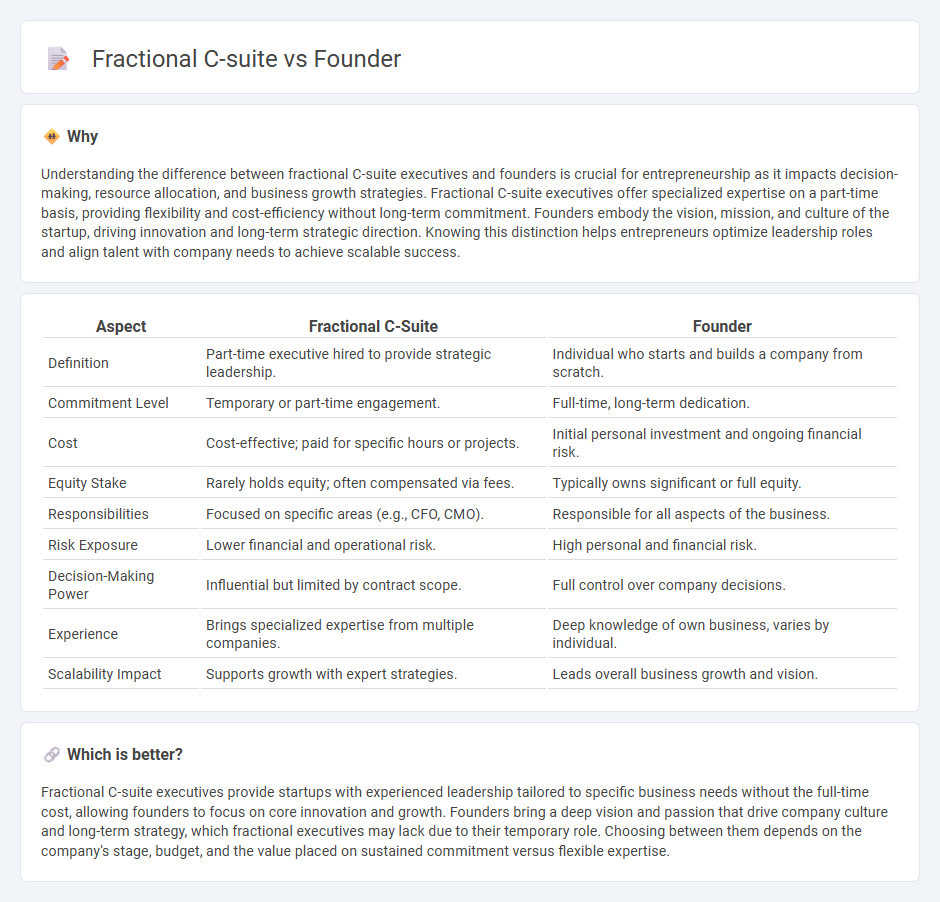
Fractional C-suite executives offer specialized leadership and strategic expertise on a part-time basis, enabling startups to access high-level skills without the full cost of a permanent hire. Founders bring a deep connection to the company's mission and vision, driving innovation and long-term commitment from inception. Explore how choosing between a fractional C-suite and a founder can impact your startup's growth and success.
Why it is important
Understanding the difference between fractional C-suite executives and founders is crucial for entrepreneurship as it impacts decision-making, resource allocation, and business growth strategies. Fractional C-suite executives offer specialized expertise on a part-time basis, providing flexibility and cost-efficiency without long-term commitment. Founders embody the vision, mission, and culture of the startup, driving innovation and long-term strategic direction. Knowing this distinction helps entrepreneurs optimize leadership roles and align talent with company needs to achieve scalable success.
Comparison Table
| Aspect | Fractional C-Suite | Founder |
|---|---|---|
| Definition | Part-time executive hired to provide strategic leadership. | Individual who starts and builds a company from scratch. |
| Commitment Level | Temporary or part-time engagement. | Full-time, long-term dedication. |
| Cost | Cost-effective; paid for specific hours or projects. | Initial personal investment and ongoing financial risk. |
| Equity Stake | Rarely holds equity; often compensated via fees. | Typically owns significant or full equity. |
| Responsibilities | Focused on specific areas (e.g., CFO, CMO). | Responsible for all aspects of the business. |
| Risk Exposure | Lower financial and operational risk. | High personal and financial risk. |
| Decision-Making Power | Influential but limited by contract scope. | Full control over company decisions. |
| Experience | Brings specialized expertise from multiple companies. | Deep knowledge of own business, varies by individual. |
| Scalability Impact | Supports growth with expert strategies. | Leads overall business growth and vision. |
Which is better?
Fractional C-suite executives provide startups with experienced leadership tailored to specific business needs without the full-time cost, allowing founders to focus on core innovation and growth. Founders bring a deep vision and passion that drive company culture and long-term strategy, which fractional executives may lack due to their temporary role. Choosing between them depends on the company's stage, budget, and the value placed on sustained commitment versus flexible expertise.
Connection
Fractional C-suite executives provide startups and growing companies with strategic leadership and operational expertise on a part-time basis, bridging gaps that founders may face due to limited experience or bandwidth. Founders benefit from fractional executives by gaining access to high-level skills in finance, marketing, or operations without the cost of full-time hires, accelerating business growth and improving decision-making. This collaboration fosters a dynamic entrepreneurial ecosystem where startup founders can scale efficiently while maintaining control over their vision.
Key Terms
Equity Ownership
Founders typically hold significant equity ownership as they are the original creators and primary risk bearers of the company, directly influencing long-term value and control. Fractional C-suite executives receive equity stakes that are usually smaller and performance-based, designed to align incentives without requiring full-time commitment or substantial dilution of founder ownership. Explore how equity structures impact leadership roles and business growth by learning more about founder and fractional executive arrangements.
Decision-Making Authority
Founders typically have full decision-making authority, shaping the vision, strategy, and culture of their startups with a hands-on approach. Fractional C-suite executives provide expert guidance and execute strategic decisions within agreed scopes, but their authority is often limited by time and contract terms. Explore the key differences in control and influence between founders and fractional executives to make informed leadership decisions.
Operational Involvement
Founders typically immerse themselves deeply in the daily operations, driving the company's vision and culture while managing multiple roles, whereas fractional C-suite executives concentrate on high-level strategic guidance without the hands-on operational workload. This distinction influences decision-making speed and resource allocation, impacting overall business agility and growth. Explore how choosing between a founder and a fractional C-suite executive can shape your organization's operational success.
Source and External Links
The Founder - Apple TV - A drama telling the true story of Ray Kroc, the salesman who turned the McDonald brothers' burger operation into a billion-dollar franchise empire.
FOUNDER Definition & Meaning - Dictionary.com - A founder is a person who establishes something, such as a company or institution.
Founder Institute: World's largest pre-seed startup accelerator - A global network that supports and empowers entrepreneurs at the idea and early startup stages worldwide.
 dowidth.com
dowidth.com